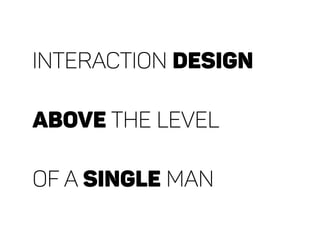Interaction Design Above the Level of a Single Man
My kick-off presentation at IxDA London Meetup October 2015. The subject of the evening was inspired by Russel Davies' post “Software Above the Level of a Single Man” — a provocation with amazingly simplicity but very deep in its implications. The main point we wanted to discuss was the shift as designers from "design for my phone, for my watch, for my [personal context here]" to "design for our car, our home, our office/workplace, our classroom, our [shared space/context here]". Because as soon as you move away from the "level of a single man", you have to deal with (and design for) the complexity of “human interactions”. And it's not only a matter of defining personas, contexts, use cases; but also of understanding relationships, hierarchies, “meanings”, emotions. Are we ready to deal with this change of paradigm? What are the complexities that we have to take into account? Are there already studies, real projects, examples of possible solutions, and what can we learn from them?

Recommended
More Related Content
Viewers also liked
Viewers also liked (14)
More from Cristiano Rastelli
More from Cristiano Rastelli (15)
Recently uploaded
Recently uploaded (20)
Interaction Design Above the Level of a Single Man
- 1. interaction DESIGN above the level of a single man
- 2. 28 October 2015 TESCO DESIGN OFFICES
- 3. Software Above the Level ofa Single Man - Russell Davies http://russelldavies.typepad.com/planning/2015/06/software-above-the-level-of-a-single-man.html
- 4. Willthe Internet ofThings set familylife back 100years? - James Pallister https://medium.com/@DesignCouncil/will-the-internet-of-things-set-family-life-back-100-years-18ce46b96646
- 5. Thinking Responsively: A Framework for Future Learning - Paul Robert LLoyd http://alistapart.com/article/thinking-responsively-a-framework-for-future-learning
- 6. Amazon Echo: We putJeff Bezos' always-on microphone-speaker in a familyhome http://www.theregister.co.uk/2015/10/16/amazon_echo “the Echo has gone from being a slightly unwelcome houseguest to a member ofthe family in a surprisingly short time. Even to the extent that the four-year-old in the house said, while away from the house for a few days "I miss Alexa." "Alexa, where is my bicycle?" asks one of the kids. Of course the answer you want is "I don't know where your bicycle is," but what you get is "I didn't understand your request." Which, oddly enough, feels a little too formal.
- 7. + = 3
- 8. ”FAMILY“
- 9. TEAM
- 10. CLASSROOM
- 11. community
- 19. [ ... ? ]
- 20. “COMPLEXITY”
- 29. “CONTEXT”
- 31. a new member ?
- 36. OUR SPEAKERS Claire Rowland UX and product consultant Nick Cristea creative DIRECTOR
